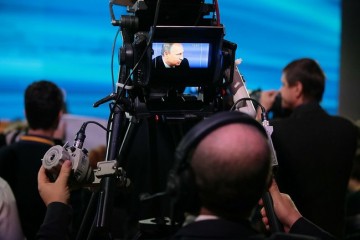Unions Battle with KGW Owner Tegna Over New Contract (UPDATED)
Thursday, October 29, 2015
Brendan Murray, GoLocalPDX Contributor
 Labor unions are claiming KGW owner Gannett spinoff Tegna is looking to bust up the network’s unions in order to replace union workers with cheaper help or prepare for a sale -- and that they are currently fighting for their lives against the newest owner of the local news station. Gannett owned KGW when many of these labor disputes began, but the company was split into two companies in June of this year. KGW is now owned by Tegna.
Labor unions are claiming KGW owner Gannett spinoff Tegna is looking to bust up the network’s unions in order to replace union workers with cheaper help or prepare for a sale -- and that they are currently fighting for their lives against the newest owner of the local news station. Gannett owned KGW when many of these labor disputes began, but the company was split into two companies in June of this year. KGW is now owned by Tegna.
In bargaining with the station's four unions, Tegna is pushing to get rid of the clause on union jurisdiction. This would mean that Tegna, who owns and operates KGW, would be able to fire employees who were hired as union members and replace them with non-union employees, who make far less than their union counterparts.
“These are commercial, for-profit stations using our airwaves, which are public property, to make a profit,” David C. Olson, former Cable Communications Director for the City of Portland and a professor of Telecommunications Law at Lewis and Clark College, told GoLocal. "Corporations have the right to make a profit and businesses should prosper but when they are using property that belongs to me and you and everyone else and using that for-profit, the law says they need to give back by serving the public interest. If they dumb down their news product by switching to cheaper amateur news gatherers from professional journalists and employees, that is going to hurt everyone."
There are three unions that represent KGW employees; SAG-AFTRA represents on-camera staff, IATSE Local 600 represents camera operators, and IBEW Local 48 represents control room operators and technicians. They have formed a coalition to fight back against Tegna's demands, saying that if the media giant gets its way, it could prove disastrous for the people of Portland.
Dave Twedell, business representative for IATSE Local 600 and the coalition's spokesman, told GoLocal that a change to the jurisdiction clause would pave the way for the station to diminish the quality of news by using work from non-professionals.
“When there are floods, fires or other natural disasters, civil unrest, whatever the situation, the news provides a public service, it’s the best way for people to find out what is going on and for public officials to get information out,” Twedell said. “It becomes a matter of public safety. If there are amateurs producing that content, that information is more likely to be incorrect or cause a public safety issue.”
Olson said that whether or not unions can withstand the challenge from Tegna will have a large impact of the future of broadcast news in Oregon.
"As KGW Goes, So goes Broadcast Journalism in Oregon,” Olson said. "If other stations see that (formerly Gannett) Tegna and KGW were able to change their newsroom staff and make a bigger profit, they will not be the only station to do so. Other stations will look to do the same thing in order to cut costs."
 “Not Just Assets”
“Not Just Assets”
According to labor groups, Tegn rationale for abolishing the idea of union jurisdiction over news gathering work is to allow amateurs to produce programming for its news broadcasts.
“They would be able to bring anyone in to do our jobs, and you couldn’t prevent that,” Brad Anderson, executive director of SAG-AFTRA in Seattle, which represents KGW employees, told GoLocal.
Twedell said that local governments rely on television personnel to get vital information to the public. Recently, the Oregon Legislature passed House Bill 2210 that formalized this reality and coined a new term, “First Informer” to complement “First Responders.” This gave a set of privileges and responsibilities such as access to blocked-off areas and training for how not to interfere with police and firefighters during a crisis.
“These stations aren’t just assets that should be used to make money,” Twedell said. “They are supposed to provide a public service, and if they start cutting qualified staff for cheaper amateurs, then they aren’t doing that.”
Diana Winthier, an attorney who practices labor law, told GoLocal that if union jurisdiction is ended, Tegna could "hire anyone off the street to do that professional work that is currently done by these union members."
"The station could chose to hire any person at any rate of pay simply to increase its profits," Winthier said. "If that happens, many aspects of the public’s viewing experience, from management of the video feed to the on-air personality providing the evening news, could be negatively impacted because of the potential decrease in the quality of employees."
Twedell said that he finds it especially ironic that KGW, which was “once considered an essential part of the community, is attempting to shirk this responsibility.”
“Before Gannett, KGW was always an integral part of the community,” Twedell said. “I think it’s very ironic or even hypocritical to watch their fall to what they’ve become.”
Other Plans?
Twedell also said that he believes that Tegna may have plans for the station’s that do not include continuing to produce and broadcast content.
License holders will have the opportunity to turn off their on-air broadcast feeds and earn millions of dollars from broadband internet companies looking to use their bandwidth to provide internet connections in an FCC licensed auction early next year. If Gannett decides to turn off their feed, they could make more than $93 million, according to a list of auction prices released by the FCC earlier this week. Twedell said he suspects Tegna may be looking for the quick paycheck.
“When Gannett (now Tegna) bought KGW and a lot of other stations a year ago, they spent $1.5 billion. If they were to sell all of those stations, they would make a $1.7 million profit on that investment in less than three years,” Twedell said. “We suggest that they are not serious about broadcasting or maintaining the tradition of KGW as a public service. Carl Ichan is a big investor of theirs and he’s known for liquidating investments and making a quick profit.”
Olson, with Lewis and Clark, said that these sales will be good news for corporations and their stockholders, but bad news for the public.
"It's going to make everybody happy. It's going to make the corporations happy, the shareholders happy, the FCC happy and the mobile phone companies happy, but it is going to be bad new for consumers." Olson said "If you're going to be making that kind of money off of public property you have to give back, not just turn around and sell it for more profit."
Tegna and KGW did not respond to requests for comment.
Editor's Note: This story has been updated to reflect that Tegna, a spin-off company owns and operates KGW. Gannett owned KGW when many of these labor disputes began, but the company was split into two companies in June of this year. KGW is now owned by Tegna.





 Delivered Free Every
Delivered Free Every
